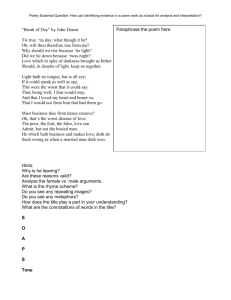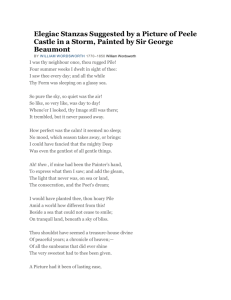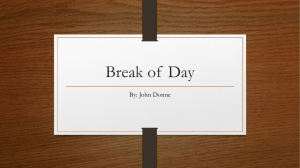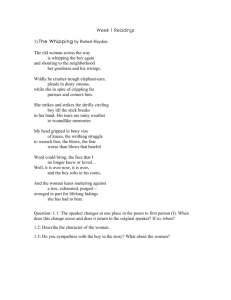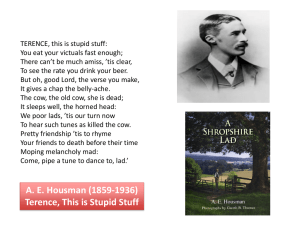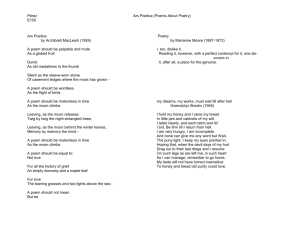Shall I compare thee to a summer's day? The Whipping Boy by
advertisement
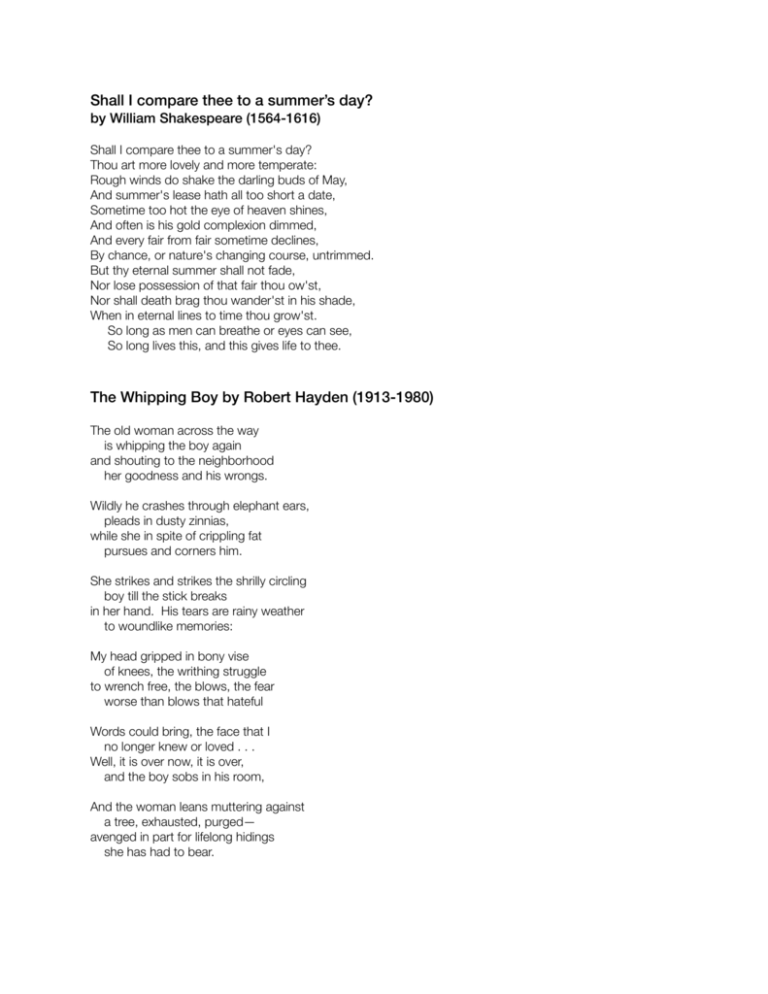
Shall I compare thee to a summer’s day? by William Shakespeare (1564-1616) Shall I compare thee to a summer's day? Thou art more lovely and more temperate: Rough winds do shake the darling buds of May, And summer's lease hath all too short a date, Sometime too hot the eye of heaven shines, And often is his gold complexion dimmed, And every fair from fair sometime declines, By chance, or nature's changing course, untrimmed. But thy eternal summer shall not fade, Nor lose possession of that fair thou ow'st, Nor shall death brag thou wander'st in his shade, When in eternal lines to time thou grow'st. So long as men can breathe or eyes can see, So long lives this, and this gives life to thee. The Whipping Boy by Robert Hayden (1913-1980) The old woman across the way is whipping the boy again and shouting to the neighborhood her goodness and his wrongs. Wildly he crashes through elephant ears, pleads in dusty zinnias, while she in spite of crippling fat pursues and corners him. She strikes and strikes the shrilly circling boy till the stick breaks in her hand. His tears are rainy weather to woundlike memories: My head gripped in bony vise of knees, the writhing struggle to wrench free, the blows, the fear worse than blows that hateful Words could bring, the face that I no longer knew or loved . . . Well, it is over now, it is over, and the boy sobs in his room, And the woman leans muttering against a tree, exhausted, purged— avenged in part for lifelong hidings she has had to bear. The last Night that She lived by Emily Dickinson (1830-1886) The last Night that She lived It was a Common Night Except the Dying—this to Us Made Nature different We noticed smallest things— Things overlooked before By this great light upon our Minds Italicized—as 'twere. As We went out and in Between Her final Room And Rooms where Those to be alive Tomorrow were, a Blame That Others could exist While She must finish quite A Jealousy for Her arose So nearly infinite— We waited while She passed— It was a narrow time— Too jostled were Our Souls to speak At length the notice came. She mentioned, and forgot— Then lightly as a Reed Bent to the Water, struggled scarce— Consented, and was dead— And We—We placed the Hair— And drew the Head erect— And then an awful leisure was Belief to regulate— Ballad of Birmingham by Dudley Randall (1914-2000) (On the bombing of a church in Birmingham, Alabama, 1963) “Mother dear, may I go downtown Instead of out to play, And march the streets of Birmingham In a Freedom March today?” “No, baby, no, you may not go, For the dogs are fierce and wild, And clubs and hoses, guns and jails Aren’t good for a little child.” “But, mother, I won’t be alone. Other children will go with me, And march the streets of Birmingham To make our country free.” “No, baby, no, you may not go, For I fear those guns will fire. But you may go to church instead And sing in the children’s choir.” She has combed and brushed her night-dark hair, And bathed rose petal sweet, And drawn white gloves on her small brown hands, And white shoes on her feet. The mother smiled to know her child Was in the sacred place, But that smile was the last smile To come upon her face. For when she heard the explosion, Her eyes grew wet and wild. She raced through the streets of Birmingham Calling for her child. She clawed through bits of glass and brick, Then lifted out a shoe. “O, here’s the shoe my baby wore, But, baby, where are you?” Kitchenette Building by Gwendolyn Brooks (1917-2000) We are things of dry hours and the involuntary plan, Grayed in, and gray. “Dream” makes a giddy sound, not strong Like “rent,” “feeding a wife,” “satisfying a man.” But could a dream send up through onion fumes Its white and violet, fight with fried potatoes And yesterday’s garbage ripening in the hall, Flutter, or sing an aria down these rooms Even if we were willing to let it in, Had time to warm it, keep it very clean, Anticipate a message, let it begin? We wonder. But not well! not for a minute! Since Number Five is out of the bathroom now, We think of lukewarm water, hope to get in it. Terence, this is stupid stuff by A.E. Houseman (1859-1936) "Terence, this is stupid stuff: You eat your victuals fast enough; There can't be much amiss, 'tis clear, To see the rate you drink your beer. But oh, good Lord, the verse you make, It gives a chap the belly-ache. The cow, the old cow, she is dead; It sleeps well, the horned head: We poor lads, 'tis our turn now To hear such tunes as killed the cow. Pretty friendship 'tis to rhyme Your friends to death before their time Moping melancholy mad: Come, pipe a tune to dance to, lad." Why, if 'tis dancing you would be There's brisker pipes than poetry. Say, for what were hop-yards meant, Or why was Burton built on Trent? Oh, many a peer of England brews Livelier liquor than the Muse, And malt does more than Milton can To justify God's ways to man. Ale, man, ale's the stuff to drink For fellows whom it hurts to think: Look into the pewter pot To see the world as the world's not. And faith, 'tis pleasant till 'tis past: The mischief is that 'twill not last. Oh I have been to Ludlow fair And left my necktie god knows where, And carried half-way home, or near, Pints and quarts of Ludlow beer: Then the world seemed none so bad, And I myself a sterling lad; And down in lovely muck I've lain, Happy till I woke again. Then I saw the morning sky: Heigho, the tale was all a lie; The world, it was the old world yet, I was I, my things were wet, And nothing now remained to do But begin the game anew. Therefore, since the world has still Much good, but much less good than ill, And while the sun and moon endure Luck's a chance, but trouble's sure, I'd face it as a wise man would, And train for ill and not for good. 'Tis true, the stuff I bring for sale Is not so brisk a brew as ale: Out of a stem that scored the hand I wrung it in a weary land. But take it: if the smack is sour, The better for the embittered hour; It should do good to heart and head When your soul is in my soul's stead; And I will friend you, if I may, In the dark and cloudy day. There was a king reigned in the East: There, when kings will sit to feast, They get their fill before they think With poisoned meat and poisoned drink. He gathered all that springs to birth From the many-venomed earth; First a little, thence to more, He sampled all her killing store; And easy, smiling, seasoned sound, Sate the king when healths went round. They put arsenic in his meat And stared aghast to watch him eat; They poured strychnine in his cup And shook to see him drink it up: They shook, they stared as white's their shirt: Them it was their poison hurt - I tell the tale that I heard told. Mithridates, he died old. Poetry: I by Adrienne Rich (b. 1929) Someone at a table under a brown metal lamp is studying the history of poetry. Someone in the library at closing-time has learned to say modernism, trope, vatic, text. She is listening for shreds of music. He is searching for his name back in the old country. They cannot learn without teachers. They are like us what we were if you remember. In a corner of night a voice is crying in a kind of whisper: More! Can you remember? when we though the poets taught how to live? That is not the voice of a critic nor a common reader it is someone young in anger hardly knowing what to ask who find our lines our glosses wanting in this world. Ars Poetica by Archibald MacLeish (1892-1982) A poem should be palpable and mute As a globed fruit Dumb As old medallions to the thumb Silent as the sleeve-worn stone Of casement ledges where the moss has grown A poem should be wordless As the flight of birds A poem should be motionless in time As the moon climbs Leaving, as the moon releases Twig by twig the night-entangled trees, Leaving, as the moon behind the winter leaves, Memory by memory the mind - A poem should be motionless in time As the moon climbs A poem should be equal to: Not true. For all the history of grief An empty doorway and a maple leaf For love The leaning grasses and two lights above the sea A poem should not mean But be.
